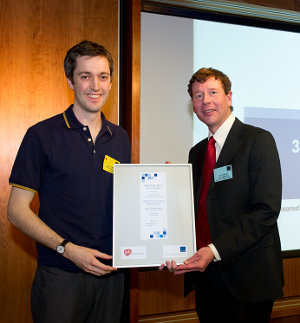Improvements for animal research

The National Centre for the Replacement, Refinement and Reduction of Animals in Research (NC3Rs) has awarded Dr Stephen Pettitt, of the Wellcome Trust Sanger Institute, a highly coveted prize for his contribution in reducing the number of animals used for research. Dr Pettitt received the recognition for developing better methods to make and track inheritance of mutations in mice, published in Nature Methods.
The NC3Rs is dedicated to all 3Rs – replacing, refining and reducing the use of animals in research and testing. The Centre’s mission is to use the 3Rs to support science, innovation and animal welfare in the biosciences and to minimise the numbers of animals used.
In the past, genetic modification of the mouse genome has been carried out mainly in embryonic stem cells derived from the 129 strain of mice. While 129 ES cells have proven to be very robust, many genetic experiments are better carried out using C57BL/6 mice as it is one of the best-characterised strains of mice and the reference strain for the mouse genome sequence. As a result, genetically modified 129 mice often need to be bred with C57BL/6 for several generations before they can be used for analysis.
Dr Pettitt’s research at the Sanger Institute generated a method of developing genetically modified mice that avoids extensive breeding, greatly reducing the number of mice bred for research.
Dr Pettitt and his colleagues addressed this problem by identifying highly germline competent embryonic stem cells – the starting point for making a mutant mouse – from C57BL/6 mice. Being able to make mutations directly in C57BL/6 cells removes the need for extensive breeding prior to analysis. They also fixed a naturally occurring coat colour mutation in this strain, changing the mice from black to agouti (brown), to further simplify the breeding system by allowing mice to be easily tracked by their colour. This greatly reduces the number of mice required for breeding.
The fixed agouti gene allows a further breeding step to be avoided. The cells are now in use in an international project to knock out or disrupt all 20,000 mouse genes, which can now be done with increased efficiency.
“I am thrilled to be awarded this prize that acknowledges my contribution to reducing the use of laboratory animals. Making knockouts directly in C57BL/6 mice will save at least five generations of mice per project that would otherwise be needed for breeding, not to mention the one to two years and the financial cost of this.
“Our research solves the historical problem of studying knockout mice in the C57BL/6 strain. Fixing the black mutation also means that no specialist albino mice need to be used in breeding schemes. This makes the whole process more straightforward for smaller laboratories that wish to use the knockout mouse project resources, so has potential benefit in all areas of biology that use genetically modified mice.”
Dr Stephen Pettitt who conducted his research at the Wellcome Trust Sanger Institute and now holds a position at the Breakthrough Breast Cancer Research Centre at the Institute of Cancer Research in London
“The Sanger Institute has always been very dedicated and focused to improving standards of animal welfare and reducing animal numbers in research. I am not just pleased for Stephen, but also for the Institute. This recognition highlights our efforts to work with animals in the most ethical manner.”
Dr Bill Skarnes Head of Mouse Developmental Genetics at the Sanger Institute
More information
Publications:
Selected websites
National Centre for the Replacement, Refinement and Reduction of Animals in Research
The NC3Rs is a scientific organisation which leads the discovery, development and promotion of new ways to replace, reduce and refine the use of animals in research and testing (the 3Rs). It is primarily supported by Government, but also receives funding from the charitable and industrial sectors. The centre has an annual budget of approximately £5.5 million and is the UK’s major funder of 3Rs research.
The Wellcome Trust Sanger Institute
The Wellcome Trust Sanger Institute is one of the world’s leading genome centres. Through its ability to conduct research at scale, it is able to engage in bold and long-term exploratory projects that are designed to influence and empower medical science globally. Institute research findings, generated through its own research programmes and through its leading role in international consortia, are being used to develop new diagnostics and treatments for human disease.
The Wellcome Trust
The Wellcome Trust is a global charitable foundation dedicated to achieving extraordinary improvements in human and animal health. We support the brightest minds in biomedical research and the medical humanities. Our breadth of support includes public engagement, education and the application of research to improve health. We are independent of both political and commercial interests.


